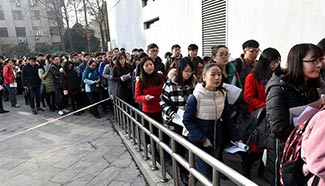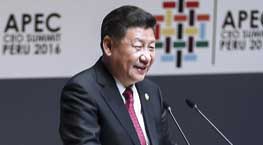by Xinhua writer Zhu Junqing
BEIJING, Nov. 24 (Xinhua) -- After Donald Trump's election, U.S. mainstream media begun to criticize Facebook for the spread of fake news, calling it to perform editorial responsibility and tighten censorship.
The accusation by U.S. elite media, which predicted Trump's defeat, goes against its long-standing chanted principle of freedom of speech, and its reproach against China's Internet governance.
Such self-contradiction demonstrates the West's lack of knowledge of the way public opinion works via the Internet. It also shows that its traditional public opinion pattern is faced with strong challenge from the Web-based information circulation.
From the unrest in Arab countries in North Africa and the Middle East to the United States, mainstream media bore a full brunt of challenges from the Internet.
As many media watchers said, "the two public opinion fields" have become a global issue, and online public opinion may bring unpredictable impact on real life. And most of them believed that the Internet has fallen into a communication instrument to spread rumors and fake information.
It is obvious that allowing bogus information to spread is not equivalent to protecting the freedom of speech. On the contrary, as U.S. President Barack Obama has warned, fake news threatens the basic principle of freedom of speech.
"If everything seems to be the same and no distinctions are made, then we won't know what to protect," he said during a visit to Germany.
In fact, creating a healthy cyberspace featuring truth, credibility, and a sense of public responsibility has nothing to do with curbing freedom of speech.
Facebook founder Mark Zuckerberg said Friday that the social network will step up efforts to weed out fake news with "stronger detection," which the Chinese government has resorted to in a bid to break rumors.
In such context, it is easy to understand China's idea to enhance Internet governance and ask Google, Facebook and other U.S. websites to follow Chinese law and comply with Chinese regulations.
It is high time for the international community to work together for the common welfare of all people, establish a cyberspace governance system to promote fairness and justice, and uphold the notions of equality and respect, innovation and development, openness and sharing and security and order.
Related:
China Voice: China moves to become an Internet power
BEIJING, Oct. 10 (Xinhua) -- Cyberspace security, the Internet and information technology have been key in China's development, and the country has been striving to build itself into a major Internet power.Full Story
China to build democratic, transparent Internet governance system: draft outline
BEIJING, March 5 (Xinhua) -- China will build a multilateral, democratic and transparent Internet governance system, according to a draft outline of the country's 13th Five-Year Plan (2016-2020) released Saturday.Full Story
China Voice: The world needs fresh rules for Internet governance
BEIJING, Dec. 18 (Xinhua) -- How and what to regulate on the Internet has been a concern throughout the world as booming Internet business continues connecting countries.Full Story










